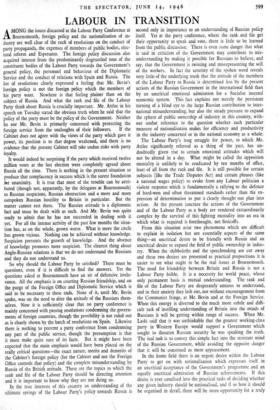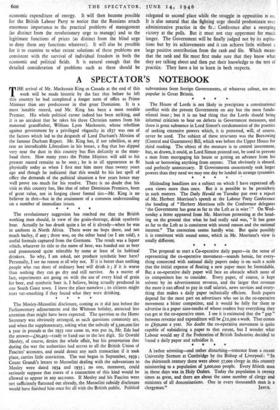LABOUR IN TRANSITION
AMONG the issues discussed at the Labour Party Conference at Bournemouth, foreign policy and the nationalisation of in- dustry are well clear of the ruck of resolutions on the conduct of party propaganda, the expenses of members of public bodies, elec- toral reform and Esperanto. The foreign policy discussion also acquired interest from the predominantly disgruntled tone of the constituent bodies of the Labour Party towards the Government's general policy, the personnel and behaviour of the Diplomatic Service and the conduct of relations with Spain and Russia. The list of resolutions clearly expressed a feeling that Mr. Bevin's foreign policy is not the foreign policy which the members of his party want. Nowhere is that feeling plainer than on the subject of Russia. And what the rank and file of the Labour Party think about Russia is crucially important. Mr. Attlee in his speech on Tuesday stated the obvious truth when he said that the policy of the party must be the policy of the Government. Neither he nor Mr. Bevin is primarily concerned with protecting the foreign service from the onslaughts of their followers. If the Cabinet does not agree with the views of the party which gave it power, its position is to that degree weakened, and there is no evidence that the present Cabinet will take undue risks with party loyalty.
It would indeed be surprising if the party which received twelve million votes at the last election were completely agreed about Russia all the time. There is nothing in the present situation to produce that complacency in success which is the surest foundation for unanimity. It is true that most of the trouble can be attri- buted (though not, apparently, by the delegates at Bournemouth) to Russian suspicions, Russian obstruction and a more and more outspoken Russian hostility to Britain in particular. But the matter cannot rest there. The Russian attitude is a diplomatic fact and must be dealt with as such. And Mr. Bevin was quite ready to admit that he has not succeeded in dealing with it yet. For all the intense activity of the past few months the situa- tion has, as on the whole, grown worse. What is more the circle has grown vicious. Nothing can be achieved without knowledge. Suspicion prevents the growth of knowledge. And the absence of knowledge promotes more suspicion. The clearest thing about Anglo-Russian relations is that we do not understand the Russians and they do not understand us.
So why should the Labour Party be satisfied? There must be questions, even if it is difficult to find the answers. Yet the questions asked at Bournemouth have an air of defensive irrele- vance. All the emphasis is on courting Russian friendship, and on the purge of the Foreign Office and Diplomatic Service which is said to be necessary to these ends. None of it, until Mr. Bevin spoke, was on the need to alter the attitude of the Russians them- selves. Now it is sufficiently clear that no party conference is mainly concerned with passing resolutions condemning the govern- ments of foreign countries, though 'the possibility is not ruled out as is clearly shown by the batch of resolutions on Spain. Likewise there is nothing to prevent a party conference from condemning any part of the public service, though the presumption is that it must make quite sure of its facts. But it might have been expected that the main emphasis would have been placed on the really critical questions—the exact nature, merits and demerits of the Cabinet's foreign policy (for the Cabinet and not the Foreign Office controls that policy) and the complete misunderstanding by Russia of the British attitude. These are the topics to which the rank and file of the Labour Party should be directing attention and it is important to know why they are not doing so.
In the true interests of this country an understanding of the ultimate springs of the Labour Party's policy towards Russia is second only in importance to an understanding of Russian policy itself. Yet at the party conference, where the rank and file get their opportunity to speak and vote, there is little to be learned from the public discussion. There is even some danger that what is said in criticism of the Government may contribute to mis- understanding by making it possible for Russians to believe, and say, that the Government is twisting and misrepresenting the will of the workers. In fact the scrutiny of the spoken word reveals very little of the underlying truth that the attitude of the members of the Labour Party to Russia is determined less by the present actions of the Russian Government in the international field than by an uncritical emotional admiration for a Socialist internal economic system. This fact explains not merely the persistent turning of a blind eye to the large Russian contribution to inter- national misunderstanding, but also the steady pressure to expand the sphere of public ownership of industry in this country, with- out undue reference to the question whether each particular measure of nationalisation makes for efficiency and productivity in the industry concerned or in the national economy as a whole.
The Labour Party's long struggle for power, to which Mr. Attlee significantly referred as a thing of the past, has un- doubtedly given rise to certain emotional attitudes which will not be altered in a day. What might be called the opposition mentality is unlikely to be eradicated by ten months of office, least of all from the rank and file. It is still possible for certain subjects (like the Trade Disputes Act) and certain phrases (like a national wages policy) to evoke from any Labour politician a violent response which is fundamentally a rallying to the defence of hard-won and often threatened standards rather than the ex- pression of determination to put a clearly thought out plan into action. At the present juncture the actions of the Government and of the Labour Party as a body are rendered extraordinarily complex by the survival of this fighting mentality into an era in which what is required is forethought, not fisticuffs.
From this situation arise two phenomena which are difficult to explain in isolation but are essentially aspects of the same thing—an uncritical desire to be friendly with Russia and an uncritical desire to expand the field of public ownership in indus- try. When the shibboleths and the speechmaking are cut away and these two desires are presented as practical propositions it is easier to see what ought to be the real issues at Bournemouth. The need for friendship between Britain and Russia is not a Labour Party foible. It is a necessity for world peace, whose only permanent basis is mutual understanding. The rank and file of the Labour Party are desperately anxious to understand, and in their anxiety they lash out, not without encouragement from the Communist fringe, at Mr. Bevin and at the Foreign Service. When this energy is diverted to the much more subtle and diffi- cult task of instilling understanding of Britain into the minds of Russians it will be getting within range of success. When Mr. Laski said that it was unthinkable that the greatest working-class party in Western Europe would support a Government which sought to threaten Russian security he was speaking the truth. The 'real task is to convey this simple fact into the resistant mind of the Russian Government, while avoiding the opposite danger that it will be construed as mere appeasement.
In the home field there is an urgent desire within the Labour Party to get on with nationalisation which expresses itself in an uncritical acceptance of the Government's programme and an equally uncritical admiration of Russian achievements. If this desire is ever canalised into the practical tasks of deciding whether any given industry should be nationalised, and if so how it should be organised in detail, there will be more opportunity for a truly economic expenditure of energy. It will then become possible for the British Labour Party to notice that the Russians attach enormous importance to the practical problems of management (as distinct from the revolutionary urge to manage) and to the legitimate functions of prices (as distinct from the blind urge to deny them any functions whatever). It will also be possible for it to examine to what extent solutions of these problems are consistent with the survival of individual freedom in both the economic and political fields. It is natural enough that the detailed consideration of problems such as these should be relegated to second place while the struggle in opposition is on. It is also natural that the fighting urge should predominate over administrative practice in the fir.. Conference after a sweeping victory at the polls. But it must not stay uppermost for much longer. The Government will be finally judged not by its aspira- tions but by its achievements and it can achieve little without a large positive contribution from the rank and file. Which means that the rank and file must first make sure that they know what they are talking about and then put their knowledge to the test of practke. They have a lot to learn in both respects.































 Previous page
Previous page